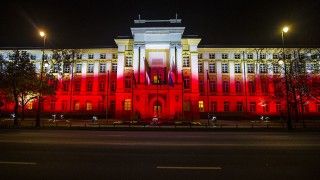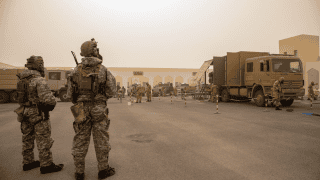- WIADOMOŚCI
- ANALIZA
Poland And Russia – A Silent War
War between Russia and Poland is already going on. Warsaw and Moscow are fighting on the battlefield of historical policy, with the Ukrainian conflict in the foreground. The first victims include the “Ida” film, the Home Army (Polish: Armia Krajowa) and the Brotherhood of Arms Monument, located in Warsaw. That Monument is also known as “The Four Sleeping Men”.
Statement made by the Minister of Foreign Affairs of Poland, Grzegorz Schetyna, in which he stressed that the Auschwitz-Birkenau Nazi Concentration Camp had been in fact freed by the Ukrainian soldiers (who were in service of the Red Army at the time), was a painful blow for the Russians. Russia, since more than 2 decades, has been trying to “own” the right to the title of the subject which defeated the Nazi Germany, reducing the contribution of other Soviet nations in that success. The paradox is, that the issue of the Soviet war crimes is treated differently – in this case the Russians minimize their role, and present themselves as a nation which is a victim of the criminal communist regime. In this way, they avoid the potential need of paying reimbursements for the other victims.
Schetyna’s words, which are right in their own respect, became a catalytic factor for the ideological conflict with Russia which in case of Poland has always been present, however, it entered a new phase now. The final image-related effect must not be beneficial for our country – since many years Poland has not been creating an aware, coordinated historical policy. However, at least on the local grounds, Warsaw could be able to be successful, which would, in turn, become a solid foundation for further actions.
The Polish “Ida” film received an Oscar in the category of the Best Foreign Language Feature. The Polish success has become a great opportunity for the Kremlin, to retaliate against the statement made by Schetyna. Kremlin officials used the narrative related to the double role of Poles during the Holocaust. It is a well-thought strategy. The international audience does not have a really in-depth knowledge of the events that were taking place in the Mid-Eastern Europe during the World War 2, hence it is a good field for manipulation. The Russian propaganda may gain approval of the Germans, who are trying hard to get rid of their responsibility related to the Nazi crimes.
The above situation which is quite detrimental for the image of Poland, could have been avoided. As it was stated by Marek Migalski in his article written for the 300polityka.pl website, it all could be neutralized by simply adding a message in the introductory sequence of the “Ida” movie, which would state that under the Nazi occupation, helping the Jews was considered to be a crime, and should the Germans learn that the Poles were helping the Jews, the Poles would face a capital punishment. No such thing happened, even though the film was partially financed by the State Film Art Institute. It did not happen because the government does not pursue aware and coordinated historical policy, as I have mentioned this above.
Another huge blow to Poland came from the Russian historical policy makers, right after the “Ida” film was announced to be successful. Here I mean the issue of declassification of the 1944-1945 archives, which, reportedly, contain a proof of crimes committed by the Home Army (sic!). It is a “coincidence” that the Kremlin made that move right before the celebrations related to the “damned soldiers”, which are planned to happen on 1st March. Is Poland ready to create an adequate response to the Russian provocation? This is, unfortunately, a rhetorical question.
Warsaw, due to the long-term negligence of the historical policy, may be successful only locally. There is some hope though – the local authorities of the capital city of Warsaw have decided not to return the Monument of Polish – Russian Brotherhood of Arms (also known as The Monument of Four Sleeping Men) to its original location – it will not be placed again at the Warsaw Vilnius Square, where it had been located before the construction works related to the Warsaw Underground started. One of the last Bierut Streets in Poland was also, not so long ago, renamed.
The process of removing the Soviet symbols from the public space needs to be completed as soon as possible. Otherwise, not only would we weaken our eastern policy, but we will also create a point of pressure for the Russians. In the former case, I mean the Ukrainian issue. Through implementation of the operation above, we encourage our neighbour to get rid of the remains of the Soviet reign. We are celebrating falls of more and more Lenin statues, and yet we are still struggling in the local fight against a set of problems which are quite similar to those faced by the Ukrainians. This is an occasion for Moscow to strike, using every opportunity to protest, whenever a Red Army monument’s locations are changed. The Russian protests are visible e.g. in an illegal renovation of the General Cherniakhowsky’s monument, who was an executioner of the Vilnius Home Army, in Pieniężno [Pieniezhno].
Getting rid of the Soviet symbols from the public sphere is a shy, first step, which may be locally successful. In order to win a larger scale information conflict, one should be prepared much better, creating proper historical policy cornerstones in an aware manner. Not only does it need to be done by setting proper goals, but also by creating relevant support measures. As I have shown it above, using the example of the “Ida” film, these measures do not need to be aggressive. In case of that film, all could have been realized in a single sentence, which would get the audience closer to the political and historical context in which the story is embedded. In many other areas, these words could become a greater weapon, than the MFA’s interventions regarding the “Polish Death Camps” expression.















